Screen Time!!
One of the biggest addictions for people of almost any age.
During Covid-19 when there was no place to go, and we were all locked up in our own homes, screen was something we all got glued to, knowingly or unknowingly.
Screen if is helpful or a boon, it also has many side effects especially for the children. Yes it is a must in today’s world to know how to use a phone, how to pay the bills online, how to attend a zoom meeting, but it is also important to learn how to keep the phone down when the work is done.
With millions of reels, and videos being posted online every day all around the world, our phones have been made so smart, that they keep us engrossed linking our previous searches to new things, may it be videos, shopping, games, or anything else. We just forget to keep the phone down.
Trust me on this, sometimes I feel my phone is listening to me, as it shows me results of things I did not search but just talked about it to someone, and I am just like, “Wow”.
Table of Contents
What is Screen Time?
The number of hours in a day we spend in front of the screen such as a laptop, mobile phone, TV or a tablet is the screen time. The lesser the better.
The screen time can be healthy screen time as well as unhealthy screen time. When you are watching educational videos, attending online classes or zoom meetings, it is healthy screen time. But when you are just scrolling social media, playing games, watching unnecessary videos or TV shows, it is unhealthy screen time and should be completely avoided.
How Much is too Much?
Anything that exceeds the limit as prescribed by the Indian Academy of Pediatrics (IAP) or American Academy of Pediatrics (APA) , is too much.
If your child is not sleeping well at night, not performing well at school, not oriented, having behavioral problems, is getting obese, you might be giving too much screen time to your child.
Never use a screen as a baby sitter. Try to engage the child in different activities when you are busy with your work, or get a baby sitter. But do not let your child use screen for long hours when you are busy in your work or meetings.
Screen Time Guidelines
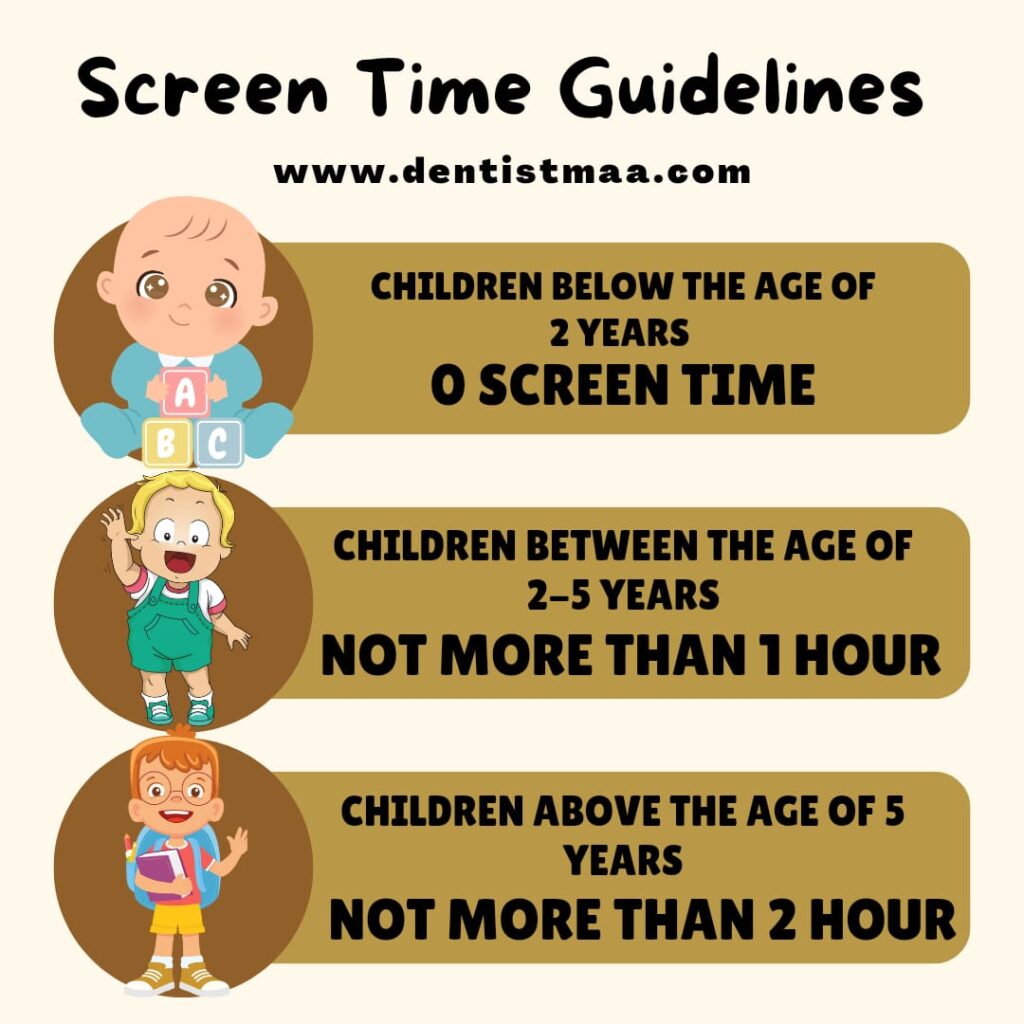
According Indian Academy of Pediatrics and American Academy of Pediatrics:
Children Below the Age of 2 Years:
NO Screen time at all should be given. Except, occasional short video calls from relatives.
Children Between the Age of 2-5 Years
Screen time should not exceed more that 1 hour.
The lesser time given on screen the better it is. If you can avoid it completely there is nothing like it. This one hour screen time should also be limited to educational videos only, through which the child learns something.
For Children Aged 5 and Above
For children above the age of 5 years not more than 2 hours should be the screen time. The total physical development is very important. Physical activity at least for an hour daily, proper family and social time, time for school homework, meal time, 8-9 hours of uninterrupted sleep is important. If this is being hampered because of the increasing screen time, it is not healthy and should be reduced immediately.
What is the Problem with the Screens?
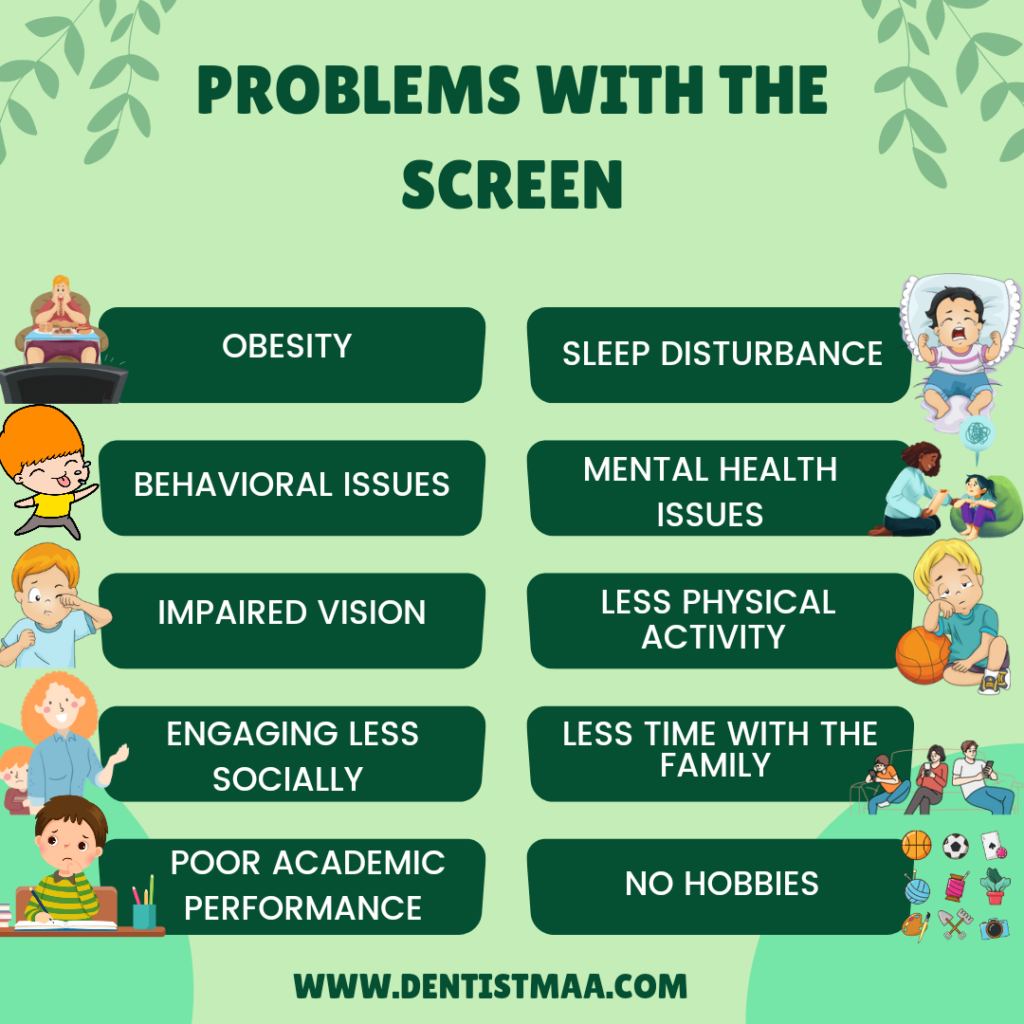
Not just one but numerous problems have been linked to increased screen time in children.
Obesity
Obesity is one of the major problems in children with screen time more than the guidelines issued and who do not participate in any kind of physical play. When you are in front of the TV all the time, you tend to eat more of junk food. This again is another cause of obesity. The advertisements that appear in between the videos focus more on the junk food like chips, chocolates, candies, aerated drinks etc. and the child will ask you for it.
Sleep Disturbances
The more is the screen time, the more is the sleep disturbances. The child will not be able to sleep on time, and will not get a peaceful sleep. Kids with disturbed sleep will grind their teeth even more. The sleep schedule becomes irregular. Loss of sleep can lead to loss of concentration, poor development of brain, poor language development etc.
Behavioral Issues
More the screen time, more social and emotional developmental issues. If the child is not interacted with the adults or the children of their age, they will not know how to be mature emotionally and socially. They will not learn how to show their emotions, and how to respond to someone when they ask them simple questions as “how are you?” Vocabulary, communication skills and eye contact are reduced as they have no idea about it.
e.g. during the Covid-19 quarantine, kids were effected the most, as they were totally cut off from the society. Our daughter who was just 1.5 years old was not allowed to go out for at least a year, and when we finally started taking her to the parks or someone use to visit us, she was so scared that she never use to leave my lap. There was zero socializing for approximately an year or may be more, and it was something not normal for her to meet people.
Same is with the screen time. Kids with too much screen time will find social interaction to be weird, and behave in very different ways when they are entering the real world. Kids with addiction to the screen will have maximum problems adjusting in school. Social anxiety is commonly seen in these children.
Mental Health Issues
Delayed speech, poor concentration, aggression, hyperactivity, anxiety, depression are seen in older kids with excessive screen time. They do not have anyone to talk to and are most of the times lonely. They have FOMO (fear of missing out). They can very easily be the target of cyber bullying. Self harm and depression are commonly seen in these kids.
Parents or care givers should make sure they do not leave their children alone and unattended especially from the beginning. ADHD (Attention deficit hyperactivity disorder) has also been linked to increase use of screens in children.
Impaired Vision
Too much screen definitely affects the eye. The eyes get strained, dry, there is double vision, blurred vision or headaches. The best solution is to reduce the screen time. Kids especially should only use screen for as little time as possible. The rule of 20-20-20 which includes, after every 20 minutes, look at an object 20 feet away, for 20 seconds.
Less Physical Activity
More screen time keeps the child so occupied that the time for physical activity is reduced or is almost zero. The child is always sitting and therefore is obese.
Engaging Less Socially
If the child is always in front of the screen, the child will not know how to engage socially. There would be social anxiety because of which the child will withdraw himself or herself even more from the social gatherings or going out to the park, as there he or she would be asked to talk to others and socialize. So, less screen time will help in better development of language skills and the child might spend more time outdoors.
Less Time With The Family
More time on the screen leads to less time with the family and therefore less bonding. The more the children play with the other family members, better will be the bond. The child will be more involved with you and it would be easy for the child to come to you and discuss any kind of problems in the future.
There should be absolutely zero screen time while having meals, there should be family outing where there should be no gadgets allowed except for important calls and messages.
Poor Academic Performance
A child who spends more time on screen, will have less time to focus on the school work. The child will have less concentration, less ability to focus, poorly developed fine motor skills to write, poor vocabulary and therefore poor performance.
The screen should be viewed only for educational purposes by the kids. Any violent or aggressive games or videos keeps the child glued to the screen, affecting their academic performance and not gaining anything out of it other than negativity. Instead of screen invest more in brain boosting toys for your child, where they can learn more and the brain works more.
Reading Lesser Number of Books
When he screen time is increased the time to read books is reduced. Once the child gets addicted to the screen her or she will never get into the habit of reading books. So, it should be taken care of early. If you are reading a book in front of the child the child will soon start getting his or her books. Prefer a hard copy to an e-book or kindle reader.
Less or No Hobbies
More the screen time, less the time to even explore and decide any hobby. If the child is aware what he or she can do, only then the child will know and understand what her or she likes. For this time is needed. And if the time is wasted on the screen, no time will be left to pursue any hobby.
Right Age to Introduce Screen to the Child

According to the guidelines, the child should not be introduced to the screen at least till the age of 2 years (except the occasional video calls from the grandparents and the relatives).
After the age of 2 years you need to accompany the child when you give the screen to the child. Make sure the child is only seeing the educational videos. No violent games or videos should be shown at all. The screen time should still not exceed more than 1 hour, the lesser the better.
The adolescent should only be provided with a normal mobile phone and not a smart phone and that too should be given only for contacting you. Personal smart phones should be completely avoided.
For elder kids, they can have a smart phone but a parental supervision should always be there.
Right Age to Introduce Social Media to the Child
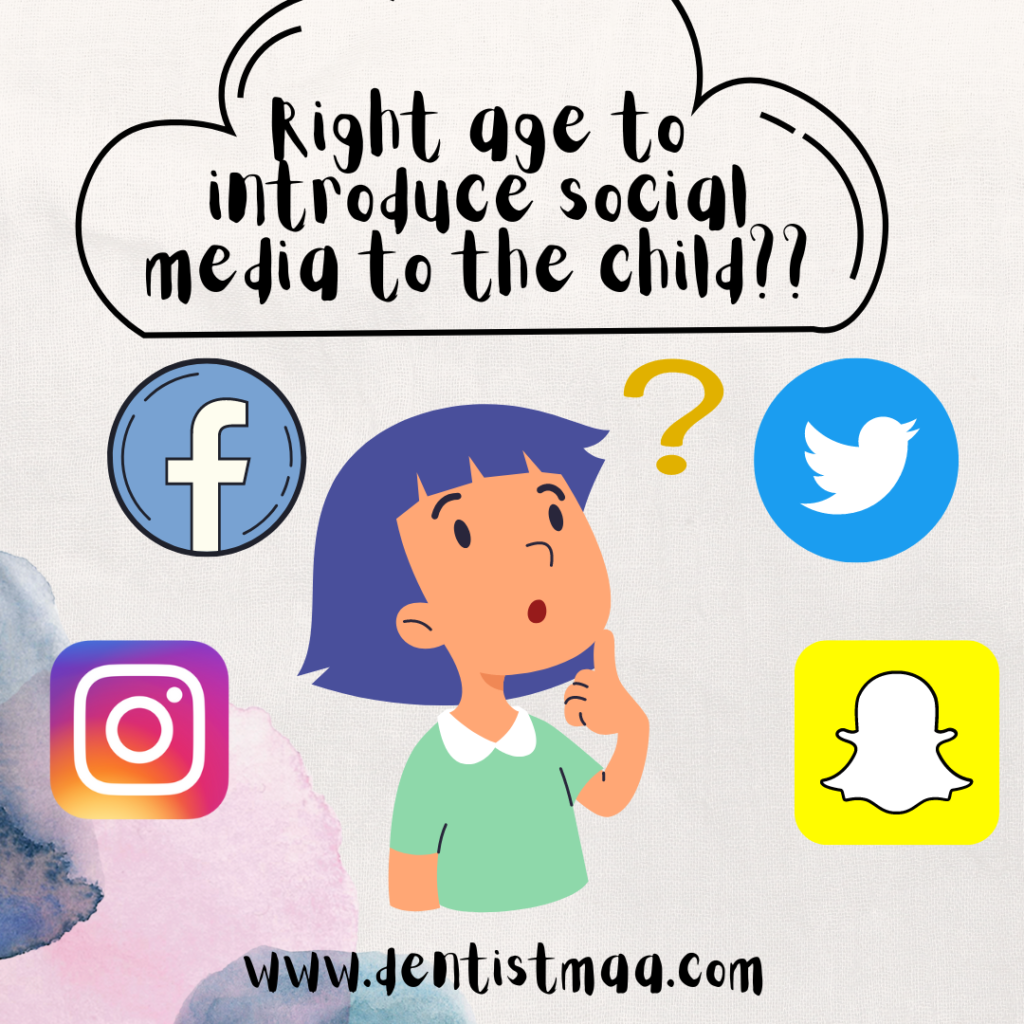
Social media such as Facebook, Twitter, WhatsApp, Instagram, Skype, YouTube, and Snapchat have become one of the most common platforms for social interaction now a days. Since Covid 19 these platforms have gained up speed as everyone was stuck at home with no humane interaction at all.
According to the IAP, a child less than 13 years of age should not be allowed to have Facebook, Instagram, Twitter or Snapchat account.
A child should not have a WhatsApp account before the age of 16 years. Games like PUBG and Cash of Clans should not be introduced to children and if they are playing the games, 18 years is the minimum age which a child should be of.
In short introduce social media to your child as late as possible. If the child insists on making a profile on social media, reason it out with the child. Talk to the child about the good online manners. Tell the child what harm can it do to them.
Following Good Online Manners
Like there are good manners in the society, so are good online manners. Every child should know the good online manners before they enter the world of social media. It becomes our duty to keep educated them from time to time, and also make sure we know what they are posting online, and also what they are looking at or following. the few good online manners are:
- 1. As it is in the society, behave as you want others to behave with you, so is online. Never post hurtful, harmful or any such post that disturbs, disrespects any other individual. Never post troll comments online. Never, insult anyone.
- 2. Never post any kind of private information such as address, phone numbers, card details, passwords etc.
- 3. Never post personal photos online. Take the consent of an adult before posting any picture.
- 4. Never meet anyone in person whom you met online. If you are doing so, take an adult with you.
- 5. If someone is bullying your child online, reassure your child that you are there for them always and block the user asap. If still the bullying continues make sure to report it to the cyber police. Make sure your child avoids the social media at least for some amount of time during such a scenario. Always have your child’s back whether the bullying is on social media or school. And always remember to trust your child, no matter what.
Any kind of Cyber crime in India can be reported on https://www.cybercrime.gov.in/ or to
Child Helpline phone number: 1098.
Certain Advantages of Social Media
Where there are side effects there are boons too.
- 1. Some kids are shy to bond publicly. But they feel more comfortable to bond on messaging. They make friends and get a little social. But a constant parent supervision should be there so that they do not bond with wrong people.
- 2. Sometimes physical classes are not possible, e.g. during Covid -19. In such cases online classes can be conducted and there is comparatively less loss of studies. Children can learn something rather than nothing sitting at home, especially the elder kids.
- 3. Kids with chronic diseases like thalassemia, Down syndrome, other rare diseases, can join groups on social media where they can bond with similar kids with their condition. Parents can help them be active in the groups, and gain out of it. This will give them more confidence to face the world.
Here is the link to facebook group related to Down Syndrome and Chrone’s Disease. The groups are for help regarding children and people suffering from the disease. - 4. Kids their age might be doing something different in some other part of the country or the world, which might interest them. They can gain knowledge out of it, and start doing something of their own.
So, when the child is using social media under supervision, he or she can get a lot out of it.
How to Motivate the Child to Use Social Media in a Healthy Way?
They do what they see. First we our self will have to follow certain rules and the kids will follow.
Digital rules should be made according to the age of the child. Children follow the rules if they are told lovingly and empathically. Make rules for the screen time for your child depending on the age of the child. But always supervise.
- The child should sit in a correct posture while using the laptop or phone.


- – The child should be asked to take a break of 20 seconds after every 20 minutes and look at an object which is 20 feet away (20-20-20). The eyes will get comparatively less tired and dry, and the effect of Computer Vision Syndrome will reduce.
- B- Blink, blinking helps in lubrication of the eye. As mentioned above, ask the child to blink every
20 minutes and look at a 20 feet away object for 20 seconds.
L– Lubricate, lubrication of the eyes is very important. If there is dryness of the eyes, consult an
ophthalmologist and he or she will suggest some lubricating eye drops. If you are also experiencing
any dryness and you wear contact lenses, best is to avoid it at home and while using screen.
I- Inches Away, the screen should be at least an arm length away. Brightness should not be too
much. any kind of strain on eyes should be avoided.
N- Near Device Break, the child should be made to take break and do some physical activity.
Outside play should be motivated.
K- Known Your Source, any information related to child’s eyes should be from a trusted source for
e.g. your pediatrician. They are the most trusted source. There is no scientific evidence that the
light coming from computer screens is damaging to the eyes. Because of this, the Academy does
not recommend blue light glasses or any special eye wear for computer use.

- – There should be absolutely zero screen time during meals, homework, family time, outings etc.
- – There should be no screen time at least 1 hour before bed time.
- – Because of screen time physical activity should not be hampered.
- – The child should be supervised while using the screen.
- – The child should be told to avoid any kind of violent or aggressive content, may it be videos, or games.
- – The young children should be restricted to use of any kind of inappropriate website. The websites should be blocked.
- – During the screen time, try to show only educational videos to the child. There are plenty of series and websites which help kids to learn. These should be encouraged. In the beginning you can start watching with the child, and slowly the child will start watching them on their own.
- – There should be a time when none of the family members use the digital devices and the time is used as bonding time with the family. Board games, cards, carom board, etc can be played during this time.
Effect of Screen Time on the Development of Brain
The brain develops the maximum by the age of 6 years, and if the child is given a device to look at all the time, the development is hampered.
The child learns by looking around and imitating the adults, and if the child or the adults is always on the phone, there is not much left to learn. When taking the child for a walk on the stroller, neither the parent nor the child should be using any device. The parent or the grand parent should be talking to the child and helping the child understand all that the child asks or wants to know. Keep asking the child small questions on the way.
Questions like, ” What color is the tree?” helps them identify colors.
Questions like, ” What bird or animal is that?” helps them identify and memories.
Questions like, ” How many dogs are there?”, helps them know the meaning of numbers.
You can think questions of your own according to your child’s age. I have been asking a lot of questions to my daughter since she started speaking or even when she use to answer only with actions.
My parents once told me, “The more you talk to your daughter and listen to her, the more smarter she will be.” and trust me, I have been talking to her since the day she is born, in fact all of us have been, and we can see the result, when she can reason out things better, understand better, respond better. She had almost zero screen time till the age of 2 years, but yes, we use to play the rhymes and make her listen and do the actions, which she use to remember and imitate.
Yes watching videos helps in increasing the vocabulary and the language but not as much as when the child plays and talks to an adult. Till the age of approximately 3 years old the child doesn’t understand much from the screen and needs a parent or and adult to communicate with.
So, to enhance the development of the brain, best is no screen time or minimal screen time.
Tips for Setting Boundaries and Limits
We are their role models. And if we follow healthy screen time habits, so will the child. If the child sees the mother or the father are always on phone, the impression they will get is, it is okay to use it. Make a screen time plan with the child. Ask the child any concerns or any inputs the child wants to add.
- 1. So, first thing to do is keep your phone aside when you do no have any work to do on it. Spend that time with the child, or doing something creative.
- 2. Fix a time for the child, when the child is allowed to watch the screen. The time should not exceed more that the limits which are mentioned in the guidelines.
- 3. Tell the child what videos or games the child can watch and play and what are prohibited due to questionable content.
- 4. The child should be encouraged to learn other outer and physical activities to the body active and fit.
- 5. Set the no screen time rule during the meals.
- 6. There should be no TV in the child’s bedroom.
Parents Role
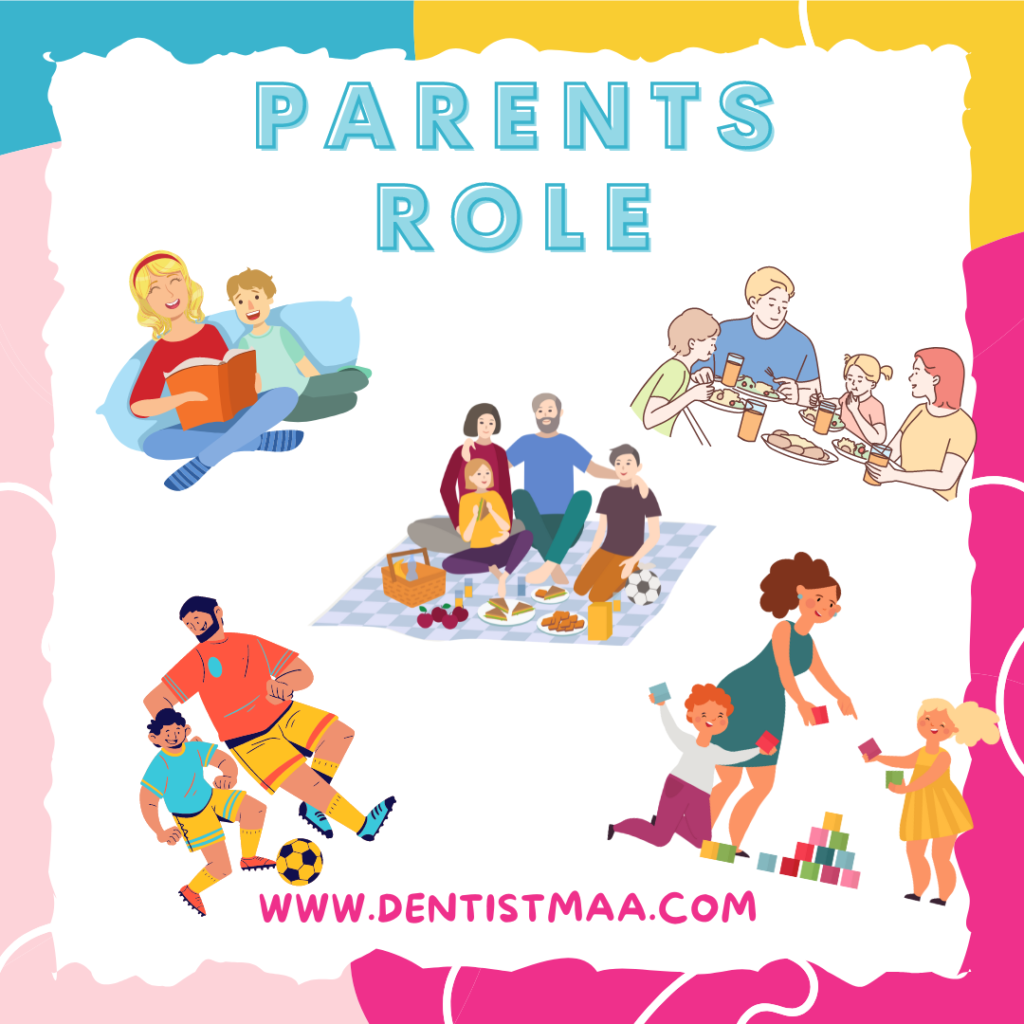
Parents or the care givers play the most important role in maintaining screen time and make sure the kids follow the screen time rules in a healthy way.
Anything the child is explained with love and empathy, the child will understand. Being a little strict sometimes helps if the child is being adamant. But avoid any type of screaming or spanking. Spanking is not acceptable and in many countries is an offence.
So the parents need to:
– Reduce their screen time and set the rules for themselves too. If you are working from home, explain the
child that you need to work and it is not for entertainment.
– The meal times strictly should be without any screens, since the birth of the child.
– Help the child engage in active play and participate with the child.
– Help them socialize. On Sunday’s or holidays, do not just give your child a phone or a tablet to spend
the whole time with, take your child out for a lunch or dinner, explore new play areas around you,
connect with friends especially those with kids your child’s age. This is a healthy way of parenting.
Appreciate the child when the child keeps the gadget down without you telling them to do so.
Your screen time affects the child’s screen time. They do what they see, not what you say.
Take Away Message
Yes screen time can be an addiction for anyone from a child to an older adult. How much is too much is what needs to be seen. One of the main reasons for depression n teenagers is increased screen time.
Screen time if is controlled and according to the guidelines might help the child, provided the child is viewing educational videos and games, the child is not looking at any violent or aggressive stuff online, and the parents are supervising the child all the time.
Everything has its pros and cons, so does screen time. The child is going to enter the digital world, and screen time is therefore important for the child, but again, parental supervision is one of the most important things till the child is an adult.
SCREEN TIME GUIDELINES FOR PARENTS BY INDIAN ACADEMY OF PEDIATRICS
Happy Parenting!!
Disclaimer:
This blog provides general information about screen time in children. The opinion and content on this blog is only for conversational purposes and should not be interpreted as medical advice pertaining to any particular individual. If the reader or any other person has a medical concern, he or she should consult with an appropriate licensed medical physician or a health care provider.

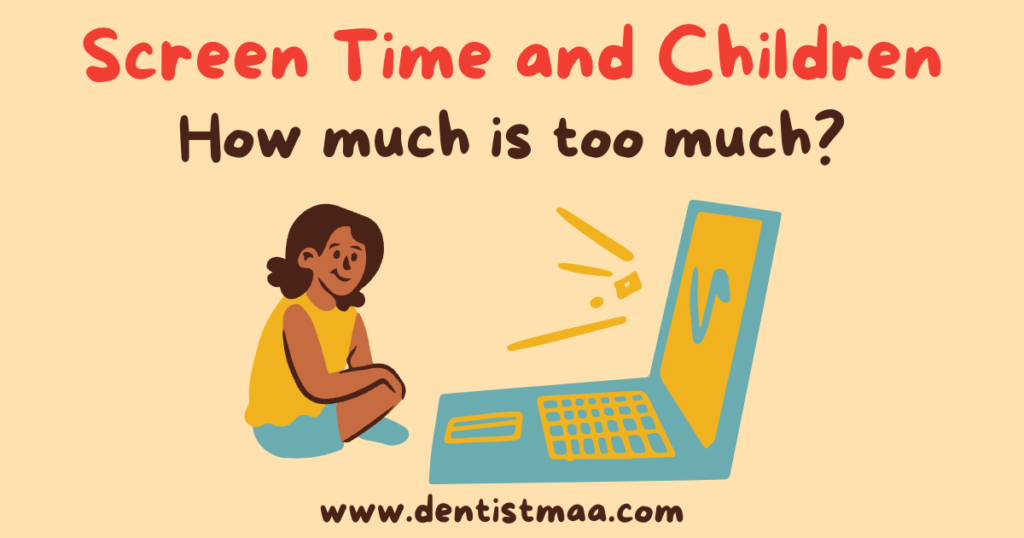



Pingback: Benefits Of Reading To Children - DentistMaa
Very nice 👍🏼
Thank you so much 🙂
Very useful information specially for today’s generation
Thank you so much 🙂
Very detailed information on the impact of screen time. Thank you for sharing.
Fantastic explanation
thank you so much 🙂